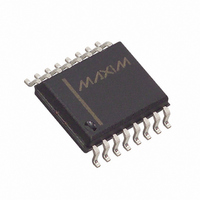DS1801S+ Maxim Integrated Products, DS1801S+ Datasheet - Page 5

DS1801S+
Manufacturer Part Number
DS1801S+
Description
IC POT DUAL AUDIO TAPER 16-SOIC
Manufacturer
Maxim Integrated Products
Datasheet
1.DS1801.pdf
(10 pages)
Specifications of DS1801S+
Taps
64 + Mute
Resistance (ohms)
45K
Number Of Circuits
2
Temperature Coefficient
750 ppm/°C Typical
Memory Type
Volatile
Interface
3-Wire Serial
Voltage - Supply
2.7 V ~ 5.5 V
Operating Temperature
-40°C ~ 85°C
Mounting Type
Surface Mount
Package / Case
16-SOIC (0.300", 7.5mm Width)
Resistance In Ohms
45K
Number Of Pots
Dual
Taps Per Pot
64
Resistance
400 Ohms
Wiper Memory
Volatile
Digital Interface
Serial (3-Wire)
Operating Supply Voltage
2.7 V to 5.5 V
Supply Current
50 uA
Maximum Operating Temperature
+ 85 C
Minimum Operating Temperature
- 40 C
Description/function
Dual Audio Taper Potentiometer
Mounting Style
SMD/SMT
Supply Voltage (max)
5.5 V
Supply Voltage (min)
2.7 V
Tolerance
20 %
Lead Free Status / RoHS Status
Lead free / RoHS Compliant
DS1801
CASCADE OPERATION
A feature of the DS1801 is the ability to control multiple devices from a single processor. Multiple
DS1801s can be linked or daisy-chained as shown in Figure 4. As a data bit is entered into the I/O shift
register of the DS1801, bit 0 of the I/O shift register will appear at the C
output after a maximum delay
OUT
of 50 nanoseconds.
The C
output of the DS1801 can be used to drive the D input of another DS1801. When connecting
OUT
multiple devices, the total number of bits sent is always 16 times the number of DS1801s in the daisy
chain.
An optional feedback resistor can be placed between the C
terminal of the last device and the D input
OUT
of the first DS1801 thus allowing the controlling processor to read as well as write data or circularly
clock data through the daisy chain. The value of the feedback or isolation resistor should be in the range
from 2 to 10 kohms.
When reading data via the C
pin and isolation resistor, the D line is left floating by the reading device.
OUT
When
is driven high, bit 0 is present on the C
pin, which is fed back to the input D pin through
RST
OUT
the isolation resistor. When the CLK input transitions low to high, bit 0 is loaded into the first position of
the I/O shift register and bit 1 becomes present on C
and D of the next device. After 16 bits (or 16
OUT
times the number of DS1801s in the daisy chain), the data has shifted completely around and back to its
original position. When
transitions to the low state to end data transfer, the value (the same as before
RST
the read occurred) is loaded into wiper-0 and wiper-1.
CASCADING MULTIPLE DEVICES Figure 4
Zero-Crossing Detection
The DS1801 provides a zero-crossing detection capability that minimizes any audible noise that may
result from sizable discrete wiper transitions when using the part in audio applications. The zero-crossing
detect feature allows independent wiper changes only when the two terminals of the potentiometer have
equal potentials and are within a 50 ms time window from the fall of the
signal. If at 50 ms the
RST
DS1801 has not detected a zero-crossing, the wiper position of the potentiometer(s) will change
regardless of the state of the input signal. Zero-crossing detection is activated when the
input level
ZCEN
is in a low-state. When high, the
input deactivates both the 50 ms time requirement and zero
ZCEN
detection crossing.
5 of 10












